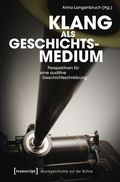Contact information
Prof. Dr. Anna Langenbruch
Institute of Music (» Postal address)
Book Series "Music History on Stage"
Editorial
The series Music History on Stage raises questions concerning the public, artistic and academic engagement with history, particularly with music history. Therein, music theater serves as a starting point: Historical musicians as well as musical practices or artifacts have been subjects of music theater for centuries. Operas, operettas or musicals about W. A. Mozart, Edith Piaf, Stradivarius’ violin or Riemann’s Dictionary of Music combine music, theater and historical narrative. Based on the work of the Emmy Noether research group of the same name, the series Music History on Stage examines how (music) history is created and experienced. How may sound become a medium of history? In what ways do academic and popular music historiography interact? How does the production of musico-historical knowledge work in theater? The series includes perspectives from musicology, the history of knowledge, the history of science and humanities, public history, theater studies and sound studies. It analyzes music history as a socio-cultural process, in which sound and sense, performance and narrative, theory and practice interact. Hence, music history on stage may be seen as an onset to exploring the role of music within the history of knowledge.
The series is edited by Anna Langenbruch and published by transcript publishing house.
Vol. 1: Sound as a Medium of History
Perspectives for an Auditory Historiography
Edited by Anna Langenbruch
ISBN: 978-3-8376-4498-2 (Print) | 978-3-8394-4498-6 (Ebook)
Bielefeld, 2018
Does sound construct history? By examining historical knowledge production as a sonic practice, the articles of this volume initiate and reflect on sound as a category of historiography. Rather than re-evaluating the auditory part of past realities, the book’s aim is to create a change of perspective in historiography, spotlighting the question how people perceive, use, stage, interpret and remember sounds – and how they use them to develop concepts of historical knowledge. Music history, as the history of a sonic art, functions as a focal point concentrating the interdisciplinary discussions in one particularly concise example.
With contributions by Susanne Binas-Preisendörfer; Daniel Fulda; Angela Grünberg; Arnold Jacobshagen; Martin Kaltenecker; Anna Langenbruch; Alexander Rehding; Stefan Weinzierl, Steffen Lepa und Omid Kokabi; Michael Werner.


